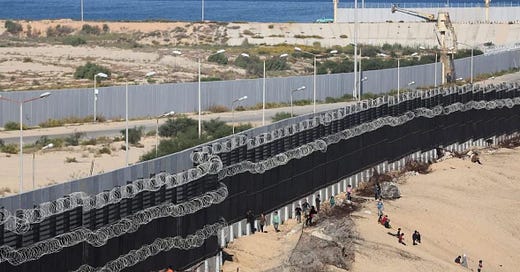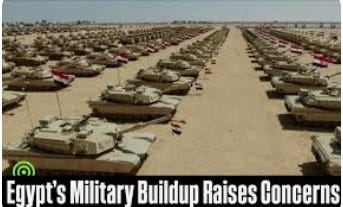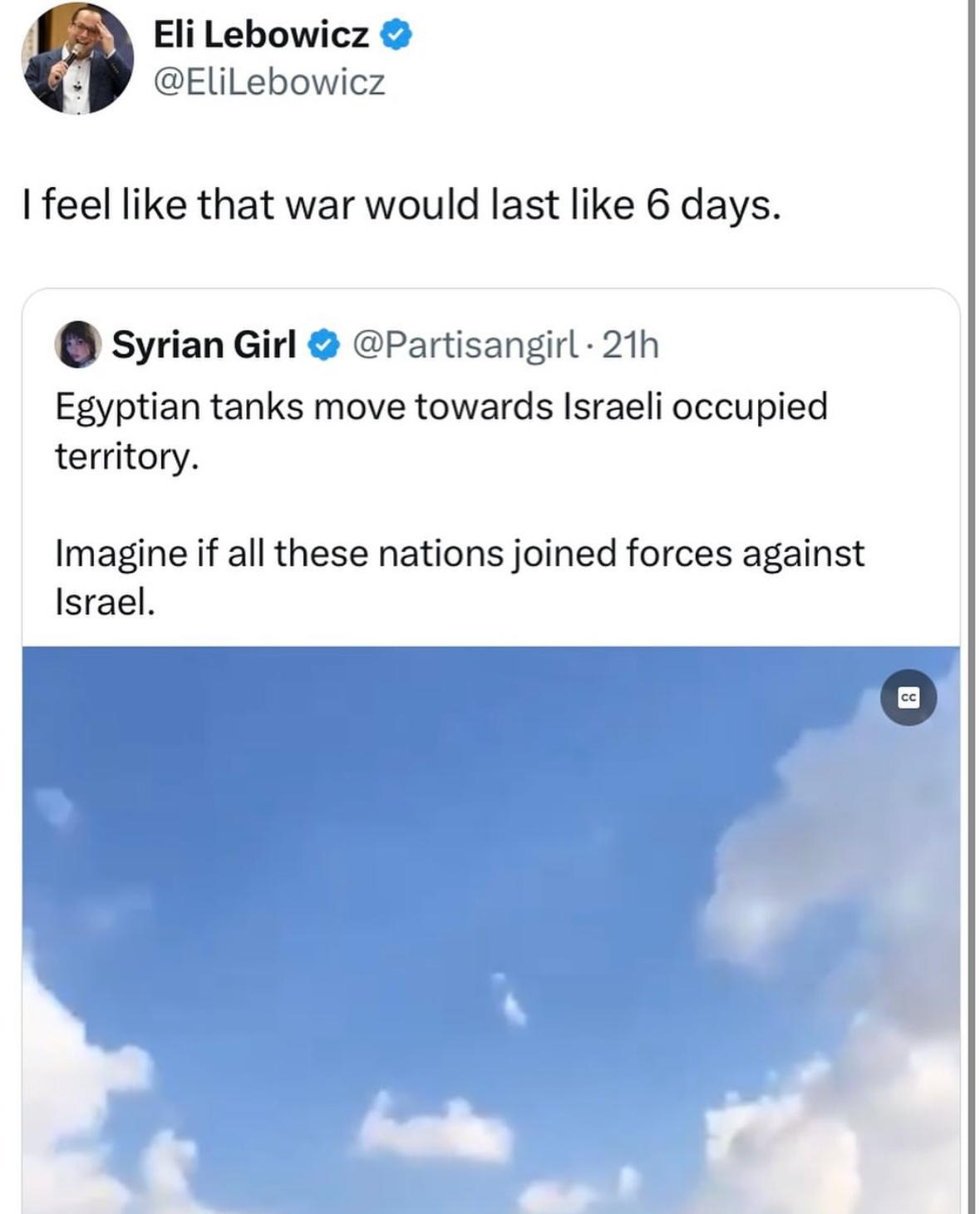Shalom to my lovely readers!
A quick disclaimer, if I may: I’m not a journalist, nor do I aspire to be one. It’s also important to clarify that everything I write is my own opinion—I represent NO ONE but myself. While I do have access to interesting sources due to my background, I will never reveal or cite them directly. Please keep this in mind when reading my content, especially this particular piece, as it touches on what I’d call delicate content. It’s charged with so much intensity that only a handful of individuals are willing to touch it.
But, as I mentioned just a few lines ago, I’m a free pilot, soaring the skies as I wish. Humbly, I’d say my writings are just one perspective among many.
Now that we’ve made this crystal clear, let’s jump right in. I want to share why I personally think we should be sleeping with our eyes wide open when it comes to Egypt, a nation with which we, Jews, share a long biblical history, as you know…
One of the lessons etched in blood and tears from the October 7th genocide is that you must constantly question reality as you perceive it. Nothing should be taken for granted as an ultimate truth—including your own judgment and worldview.
This shouldn’t be determinism but relativism, nor should it be fatalism but providence.
When you perceive reality as absolute rather than subjective—whether in an ontological sense or in the certainty of your own perception—you risk exposing yourself to hubris, as if you possess the ultimate truth. Well, you don’t. And thinking otherwise is how dangerous, fixed conceptions are born—rooted in wishful thinking and intertwined with the notorious sin of pride.
NO, you don’t know it all.
NO, you don’t have the privilege of postponing or neglecting reality.
NO, you are never in a position to dismiss someone who presents hard-core data and analysis that shows, in black and white, that the enemy is no longer deterred—simply because you hold a higher rank.
And ABSOLUTELY NOT do you have the right to surround yourself with yes men who never challenge your perspective out of fear of alienating you or jeopardizing their promotions.
You cannot afford such complacency when you’re surrounded by hostile neighbors who dedicate every minute of every day to plotting and actively working toward your destruction.
You know what you can and should do, among other vital actions? Trust what you see with your own eyes.
If your enemies are training and simulating a massacre in which you are the target, trust that they’re not doing it “for fun.” They are doing it with the intent to execute it. And they will, sooner than you think—unless you wake up.
Also, in the name of the progressive, delusional “politically correct” agenda, your words are being altered to the point where even you are camouflaging the truth—truth that must be acknowledged before it invades you, embodied in thousands of Islamist terrorists and other “innocent souls” (as the world likes to call them). These are lessons carved into the skin and bones of our people—the people of the Holy Land, Israel.
And that is why I want us to take a brief, conceptual look at Egypt today.
Let there be no misunderstanding—we do not have true peace with Egypt, at least not in the sense that “peace” brings peace of mind, allowing us to consider that front secure.
If we’re being honest, it’s no secret that this is not the case.
Did you know? While Egypt formally recognized Israel as part of the 1979 peace agreement, it DID NOT acknowledge it as a Jewish state. Yeah, long live the difference. We cannot afford to ignore this tiny detail—it tells us a lot.
What we actually have with Egypt is not peace, but a non-warfare agreement.
While Israel calls it peace to avoid another war front like in the good old days, Egypt sees it very differently—not only as temporary, but as a tactic to lull us into complacency while they quietly grow stronger.
Let’s not sleepwalk into an active volcano, okay?
No one really speaks about the enormous threat Egypt poses to Israel, largely because it’s inconvenient—there’s a determined effort to avoid disrupting the delicate balance between the two states. Why? Because merely acknowledging the threat might spark mistrust.
As if there’s any real trust between the two sides to begin with.
It might also lead to a self-fulfilling prophecy, making a reality out of something that supposedly wasn’t there before.
Well, as you can probably tell by now, I disagree with all of that.
The elephant in the room is far too big to ignore—bigger than an Abrams M1A2 military tank, which the Egyptian army now possesses in large numbers.
So, let’s ask the obvious question:
What exactly are you training for, Egypt?
Which country or external entity is threatening you?
To justify violating the peace agreement in the Sinai Peninsula, Egypt claimed its enhanced military presence was only meant to counter ISIS terrorism in Sinai. But once we gave them a finger, they took the whole hand—and Israel is not okay with their endless breaches of the treaty.
WE DON’T WANT THEM THERE—AND WE ARE NO LONGER WILLING TO LOOK THE OTHER WAY.
They are building tunnels—not just under the Rafah border but also under the Suez Canal. Credible intelligence suggests that some of these tunnels are large enough for tanks to pass through.
They have also been constructing new bunkers, placing anti-tank obstacles, and making other strategic military preparations.
This is all public information—and with just one click, you can verify every word.
So, again we need to ask: Why?
Why is Egypt diverting billions of dollars into a massive, unprecedented military buildup—acquiring advanced capabilities, weaponry, and manpower—while its economy is collapsing?
Why is this military expansion happening at the expense of its own people, millions of whom are living in severe poverty, barely above sewage conditions?
Why are multiple military routes being built so Egypt can quickly mobilize its enormous army in Sinai—a strategic G-Spot (but not a pleasant one) for launching an attack on Israel? Why does Egypt need submarines? Who are they meant to target?
And the million-dollar question:
Why, in Egypt’s war simulations, is the enemy always Israel?
Why are they training specifically to fight IDF forces? Even before the war in Gaza began, these were their primary training operations.
Is that a coincidence? Please, don’t insult our intelligence.
Let me just quickly remind you who else recently trained these exact simulations in our backyard—yes, that’s right, Hamas-ISIS before launching their October 7th genocide against Israel.
And who are the threats that supposedly justify this massive military buildup?
Let’s try to map out Egypt’s potential nemeses really quickly, ok?
The Houthis... right?
The Houthis have supposedly caused major economic losses for Egypt with their repeated strikes on merchant ships and the naval blockade, leading to a severe hit to Suez Canal revenue.
And yet—Egypt refused to join the international coalition, led by the U.S., to secure those shipping routes.
Umm… how interesting.
The assumption that Egypt declined the invitation to join this prestigious coalition out of fear of upsetting the Houthis' sponsors—AKA Iran—doesn’t fully explain the situation in my opinion.
Here are two key explanations that I find far more convincing:
A. I’d bet—though this is just a wild guess, purely a hunch—that if this were thoroughly investigated, we’d find that Egypt and the Houthis have a secret financial arrangement. Meaning, what appears to be economic losses in trade isn't actually affecting Egypt—it’s just a façade.
B. How could Egypt possibly go against the Palestinians—whom they “support”—by opposing the Houthis, who allegedly initiated this naval blockade in response to Israel’s operation in Gaza?
That would make it look as though Egypt were actually supporting Israel...
And what would the Arab world think of that?
That would be perceived as "vile" collaboration with the so-called “Zionist
occupier”—which, let’s not forget, is exactly how Egyptians perceive Israelis.
That’s the Egyptian border with Gaza. WOW massive! What? They don’t want the Gazans to invade their country? Oh no! Why is that?!
Over 22 Arab countries refuse to take in the Palestinians—what do they understand that much of the world still refuses to see? I wonder… 🤔
Conclusion?
The Houthis are NOT an enemy of Egypt.
At least, not one that justifies an armament race of this magnitude.
OK, what else do we have?
A Conflict with Ethiopia Over the Blue Nile River Dam
Egypt fears that the nearly completed Grand Ethiopian Renaissance Dam (GERD) on the Blue Nile River—a crucial water source for both Egypt and Sudan—will significantly impact its water supply. From Egypt’s perspective, any reduction in this supply poses a severe threat not only to its economy but also to its national security. However, this water dispute is not the driving force behind Egypt’s ongoing military modernization and expansion.
While tensions between Egypt and Ethiopia remain high, an outright war is highly unlikely. Even with Egypt flexing its military strength through a new security deal with Somalia—raising concerns in Ethiopia—geographical constraints make direct conflict extremely difficult. The two countries are separated by roughly 800 kilometers of challenging terrain, including the Sahara Desert and a lack of direct sea access, which severely complicates large-scale military operations. There is much more to explore on this issue, but this provides my core argument.
Rolling out yet another possible explanation leads us to the last apparent option: Libya.
An Indirect Conflict with Libya
A full article could be written about Libya’s internal power struggle, but we won’t dive that deep. What’s truly important to understand is that since the death of former Libyan dictator Muammar Gaddafi, many ‘players’ want a piece of resource-rich Libya—the larger the share, the better. But the desire to take over resources is just one of many aspects of Egypt’s interests in Libya. Border security is another major concern.
Egypt doesn’t want Muslim Brotherhood-aligned Turkey gaining a substantial foothold in Libya, as tightening its grip would pose a serious cross-border threat. Don’t forget that former Egyptian President Mohamed Morsi, a Muslim Brotherhood leader, was forcibly removed by President Abdel Fattah el-Sisi, who despises the Muslim Brotherhood and most certainly doesn’t want them entrenched on Egypt’s western border.
Ultimately, this isn’t just about Libya—it’s an Egypt-Turkey dispute, with Libya as a powerless pawn between two titans.
All in all, this rivalry is indeed causing tension, but not a direct conflict. A full-scale war between these two Arab countries has only a 1% likelihood, for reasons beyond the scope of this piece.
It doesn’t add up—don’t you agree? So, let me challenge you once again with the obvious question:
Why is Egypt, under President Sisi, building such an incredibly massive army?
Is this truly an enigma?
We've established that Egypt has no objective reason to enhance and modernize its military forces and capabilities to such an extent, as it has no real enemies or immediate threats putting a sword to its neck—and this was just the first chapter.
In the next chapter of this Egypt zoom-in, I’ll cover (among other things) the collective anti-Israel sentiment dominating Egypt’s streets and its people’s staggering support for the Muslim Brotherhood, of which Hamas-ISIS is an offshoot. The Muslim Brotherhood is a radical Islamist jihadist movement that seeks global domination and currently poses a direct threat to the entire free world.
We’ll also discuss the well-known tactic of initiating war to distract a starving population on the verge of rebellion, briefly touch on Egypt’s "victorious" pathos surrounding the Yom Kippur War—a war they launched in a surprise attack against Israel in 1973, together with a coalition of Arab states, on the holiest day of the Jewish year (an attack eerily similar in its element of surprise, chosen timing, and other key characteristics to the one on October 7, 2023—exactly 50 years later), and of course, there’s also the fact that Egypt rejects the so-called 'beloved' Palestinian 'refugees' it claims to support and fiercely opposed Trump’s plan to relocate some of them to Egypt—and more.
As you know, Israel is always and only defending itself—meaning, we only go after those who seek and act to destroy us. We do not seek confrontation for no reason. We believe in live and let live—but for those who reject that and want to kill us, we won’t let them, and we most certainly will NOT be friendly with them.
If Egypt were to attack, Israel would reenact the holy biblical miracle of the parting of the Red Sea (Keriat Yam Suf in Hebrew)—and once again, Pharaoh’s army would be washed away.
It’s worth mentioning that if, God forbid, Israel were to be attacked by Egypt and forced to defend itself against a massive Egyptian assault, taking out just one or two targets—the Renaissance Dam and/or the Aswan High Dam (located on the Nile River)—with one bomb would be the way to go. Literally.
It would fundamentally transform Egypt in every possible way—demographically, geographically, economically, and in terms of security—for years to come. I’d keep that in mind if I were you, Egypt... Swim about it.
Stay tuned for my next chapter on Egypt, and don’t forget to keep seven eyes on Egypt while you're at it.
***If you know who to credit for the attached images and video, please let me know, and I’ll make sure to do so!
***For anything else—recommendations, notes, or corrections—feel free to reach out! I’m always open to constructive criticism, as long as it’s intelligent. 😉
Thanks! :)
I’m kinda new to Buy Me A Coffee Link do you think they have tequila there? 😉 If not, a good ol’ coffee works just fine! Your support helps fuel my work (and my caffeine levels). Check it out and make a pledge if you’d like to keep the ideas brewing: . L'chaim!
Tzlil Berko is an experienced security consultant and entrepreneur. She is also an avid writer of poetry, song lyrics, short stories, scripts, & more. Tzlil has played a major role in conceiving and writing with her parents, Drs. Anat & Reuven Berko, a TV psychological thriller and family melodrama drawing on Dr. Anat Berko's books and the family's remarkable personal story. She is currently completing her thesis on the potential relationship and influence between terrorism and the Metaverse.







My spidey sense is also tingling about Egypt.
Interesting and informative article, thank you for your work!